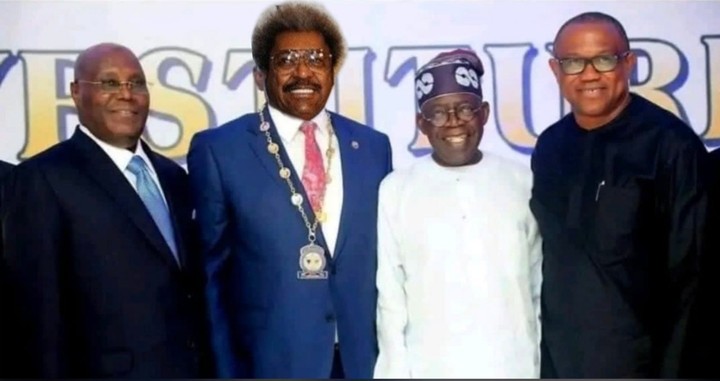The 2023 election is about 40 days away, and the campaigning for the major candidates in this election has reached its highest points. The candidates have less than 40 days to tell Nigerians what they’ll do if they’re elected. In this article, we’ll be presenting the major economic policies of Atiku, Obi, and Tinubu broken down to kindergarten level.
EVURA has discovered that some Nigerians find it hard understanding the complex level the main presidential candidates explain their economic policies. In this article, we’ll be breaking it down to make it easier for anyone to grasp.
The Major Economic Policies of Atiku, Obi, and Tinubu Broken Down to Kindergarten Level
Before we proceed to the issue of these policies, you should know the current situation of Nigerian economy at the moment. The economy suffers one of its worse moments in the history of Nigeria. Let’s take a look
The Situation of Nigeria’s Economy in 2023
1. Nigeria is the world poverty capital of the world with over 80 million Nigerians wallowing in extreme poverty.
2. Nigeria is owing around $100 billion in local and foreign debt. This makes Nigeria one of the most indebted nations in the world.
3. Notwithstanding the high amount of debt, Nigeria is heavily lagging behind in infrastructure. According to report, Nigeria hasn’t met over 60% of its infrastructural needs.
There is no constant power supply. Most roads are bad. Low housing, and so on.
4. The Unemployment rate is at an all time high. More than 33% of Nigerians are unemployed.
We can go on and on. The major question on the minds of Nigerians is what will the next president do to solve this mess?
Abubakar Atiku (People’s Democratic Party)
Atiku calls his economic plan Nigeria’s economic recovery plan. He had stated that he’d enact some economic policies to lift the country economically. These policies are:
1. Injecting $10 billion into the economy, targeting Medium enterprises for optimum performance and employment generation.
2. Seeking debt forgiveness and cancellation for Nigeria. In addition, limiting the issue of borrowing.
3. Improving power supply to from around 8,000 megawatts to 25,000 megawatts.
4. Introducing proper Federalism as such each states harnesses its mineral resources, develops itself, and generates money for itself.
5. Improving security by enlarging the number of security forces, and equipping and overhauling the structure for a more effective one.
6. Unification policy and strategies to make the country work and develop cohesively.
7. The economy shall be private-sector driven for good economic growth. Atiku foretells a consistent over 3% GDP growth, and a focus on manufacturing and services as such that manufacturing becomes the major contributor to Nigeria’s economy, displacing Agriculture.
Peter Obi (Labor Party)
Peter Obi calls his economic plan Consumption to Production. He promises to move Nigeria away from consumption to production if he is elected. Below, are some of the points of his plans:
1. To build a strong economy that produces instead of consuming. There’ll be on agriculture and manufacturing than importation.
2. Improving the level of accountability in governance. Aside from accountability in governance, accountability in other sectors of Nigeria shall also be entrenched.
3. Reducing the level of expenditure by government and government officials.
4. Building and upgrading Nigeria’s infrastructure.
5. Enacting policies geared towards improving the living standards of Nigerians. These laws would improve human rights conditions of Nigerians.
6. Unification and equity would be entrenched in his government.
7. Bringing a level playing ground and government’s efficiency for citizens and businesses.
Bola Tinubu (All Progressive Congress)
Bola Tinubu calls his economic plan or manifesto Renewed Hope 2023. He made his plans known. These are the major ones:
1. Provision of more funds and money to the State and Local Governments. This is in a good way encouraging true federalism. Since the state and local governments are closer to the people, they should get more funds.
2. Improving and enhancing Nigeria’s oil output and production. Thus, Nigeria’s oil production will increase if he is elected. He states that he’ll be growing it gradually.
3. Investing a lot more in education. He will provide the biggest investment Nigeria has ever seen in education.
4. Championing borrowing, loans, lending, among Nigerians. Therefore, Nigerians can easily apply for loans for education, mortgage, and other needs.
5. Unlocking the economic prosperity of every region in the country. His government shall focus on improving the economy of each region according to its needs.
6. Improving Nigeria’s power and agriculture sectors. The other sectors would also be touched. This will, in a great way, grow the economy.
Conclusion
This article has presented the major economic policies of Atiku, Obi, and Tinubu broken down to kindergarten level. You should read through them and make your choice. While preparing to vote, you should consider the one who has track record of good governance and delivery of campaign promises.
